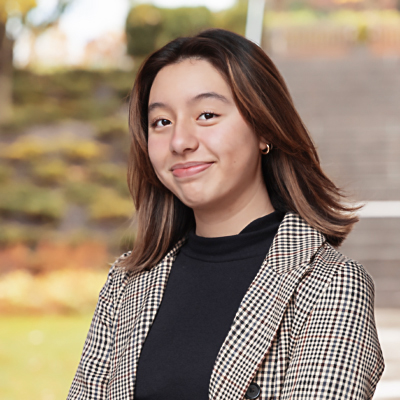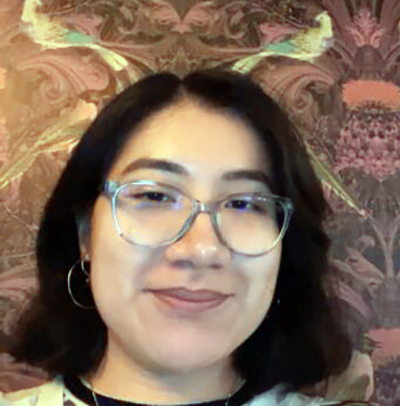Through summer program, BC undergrads consider a legal career
A summer career exploration experience helped Amaris Ramos, a rising junior in Boston College’s Lynch School of Education and Human Development, solidify her interest in pursuing law school after graduation.
She and another BC undergraduate, also interested in a legal career, had an immersive opportunity to explore the study and practice of law through a program at Stanford Law School.
Ramos and Morrissey College of Arts and Sciences rising senior Alexa Piedra were among only 20 college students nationwide chosen to participate in the selective Stanford Law Scholars Institute (SLSI), held in June
Both born and raised in Texas and of Mexican American heritage, they were part of the third SLSI cohort. Held on the Stanford Law School campus, the institute is a fully-subsidized, residential, and experiential learning program that provides participants with activities, workshops, networking events, and other programs to help them prepare for law school—from navigating the application process to charting a course toward a future legal career.
“SLSI showed me the power of each individual's voice in the legal system, both as practitioners and participants,” Ramos said. “The program imbued me with a sense of strength in my identity, in diversity, and in their ability to transform who the legal system serves.”

Amaris Ramos '26
Ramos, of El Paso, is majoring in transformative educational studies and political science at BC, with a minor in English. She aspires to learn from the world around her, and gain understanding through the narratives of those she encounters, according to her institute bio. At BC, she has sought to raise awareness of the importance of life stories, especially those of people of color, to create a space where all feel welcome. Her goal is to facilitate change in the government and education sectors, by promoting greater inclusivity of underrepresented voices.
“The program complemented my BC studies by reinforcing the idea of looking inward to transform the world outside of us and serve the whole person,” Ramos said. “SLSI allowed me to reflect on my BC education and highlight how it has served my journey in navigating the world of academia as a student of color and how I can use that experience to change it for the better, breaking down its borders and welcoming all.”

Alexa Piedra '25
At BC, Piedra—a political science major and management and leadership minor from Houston—has volunteered at Catholic Charities El Centro teaching adult immigrants English, and at the Prison Book Program, sending books incarcerated individuals.
These experiences, according to her institute bio, have exposed her to the complexities of the incarceration system and to the difficult transition period for immigrants in the U.S. They also inspired Piedra’s research on the rights of undocumented workers via her involvement in the McNair Scholars Program, which is part of the Pine Manor Institute for Student Success and prepares undergraduates from first generation and underrepresented backgrounds to pursue and attain advanced degrees to enter careers in research and academia. Piedra said as she continues her professional learning journey, she "hopes to make meaningful changes to the areas she has the privilege of stepping into.”
The SLSI is part of an effort to help create a legal profession that better serves all communities, according to the program website. Led by Diane Chin, co-founder and co-director of the SLSI Institute and former Stanford Law inaugural associate dean for public service and public interest law, and Faye Deal, Stanford Law associate dean for admissions and financial aid, the institute benefits undergraduates who want to explore the opportunities and rewards of a legal career.
The scholars gain insight into academic life at a law school through a schedule of classes with prominent Stanford Law faculty, group discussions, workshops, and a field trip to a San Francisco courtroom and to city hall, among other activities.
“A legal education can seem out of reach for many students, especially those from communities that have been historically underrepresented in the legal profession,” according to Chin. “Our goal is to lower the barriers to access to law school and a law career by immersing the scholars in the law school academic life and introducing them to the many areas of law and the vast array of options a law degree can provide.”
Beyond the academic and social activities, the cohort received assistance with the law school application process, including a LSAT preparation course and ongoing coaching which will continue through the process of applying and gaining entry to law school. SLSI also provides both online training and a speakers’ series.
“Much of the knowledge needed to apply to law school is not taught in the classroom,” according to Deal. “By providing guidance in crafting a strong law school application and helping the scholars build soft skills such as time management and addressing imposter syndrome, we hope this program will help prepare our scholars to be successful in their law school journeys.”
“SLSI definitely enhanced my interest in pursuing law school after graduation,” Ramos said of the experience. “Before, I was unsure of wanting to attend law school because of the surface-level, unwelcoming idea I had of it. However, SLSI brought such a new and fulfilling perspective on law school by centering it around the whole person and the relationships we engage in. It reignited and further set aflame the passion I have to transform our government and legal system through the connections we make with others.”
